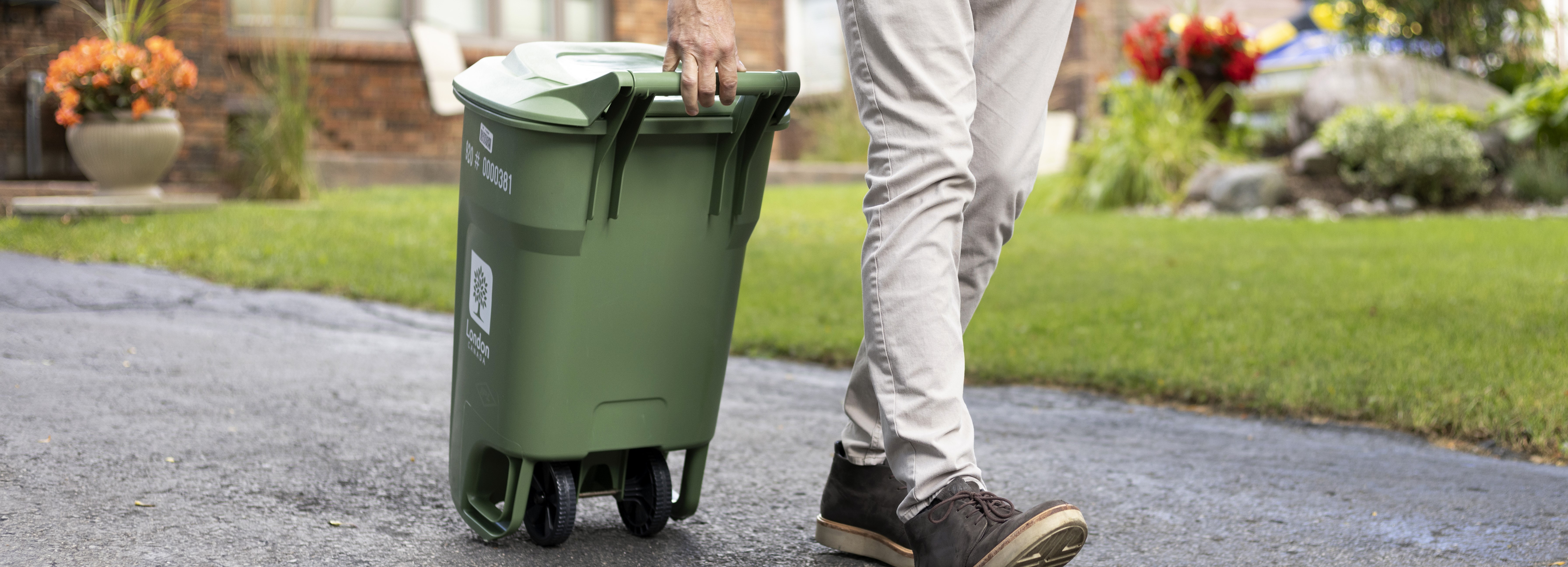We supported many advancements in climate action and sustainable growth this year. Guided by the Climate Emergency Action Plan, we focused on key initiatives that support a greener, more resilient future.

Green Bin rolls into London
A major highlight was the implementation of the Green Bin program to divert waste away from landfills. The program successfully collected over 6,700 tonnes of organic material by June 2024, which is being transformed into a nutrient-rich product for agricultural use.
Participation in the program has steadily increased from 40% to about 60%, in line with other Ontario municipalities. We have taken steps to address challenges such as illegal dumping and compliance issues, ensuring the program's continued success. The introduction of a Green Bin pilot in multi-residential buildings is another key development, with data collection underway to refine and expand the initiative.
Increasing our tree canopy one seed at a time
Through our free tree depots, we gave away more than 5,450 free trees to residents — enough to produce oxygen for nearly 11,000 people once fully grown. In addition, we planted 3,700 new trees across London, which will one day provide the same cooling effect as running 37,000 air conditioners. These efforts are part of our commitment to grow and maintain a diverse, sustainable urban forest.
Sustainable practices at the Greenway Wastewater Treatment Plant
Another notable achievement took place at the Greenway Wastewater Treatment Operations, where we obtained fertilizer accreditation for our stabilized waste solids, which will be used in the re-build of the Greenway incinerator. By the end of 2024, we will present the final recommendations of the Biosolids Management Master Plan, which outlines strategies to generate biogas from wastewater solids for use in fueling vehicles and generating heat and electricity, further reducing our environmental impact.
Flood protection and climate resilience
We improved flood preparedness with enhanced warning systems, new weather stations, and expanded floodplain mapping. Conservation authorities issued critical flood bulletins, expanded infrastructure, and delivered training programs to mitigate risks and safeguard communities.
We were is involved in several flood protection and disaster mitigation projects. The Disaster Mitigation and Adaptation Fund (DMAF) project at the Greenway Wastewater Treatment Plant is under construction, while a similar project at the Adelaide Wastewater Treatment Plant will soon be tendered. The Broughdale Dyke project is currently in the design phase, contributing to our climate resilience.
Urban naturalization and ecological restoration
As part of our ongoing commitment to urban environmental sustainability, we completed urban naturalization at McNay Drain. Urban naturalization work is underway at Mud Creek, contributing to both stormwater management and ecological restoration. We are progressing with three “complete corridor” projects in the Dingman Creek subwatershed that will support stormwater management for new subdivisions while enhancing pedestrian and ecological linkages.
Sustainable infrastructure with Dingman Creek Pumping Station
We've invested in sustainable infrastructure with the construction of the Dingman Creek Pumping Station, which was designed without using natural gas for its heating system. Instead, the station uses electric boilers, and its design allows for the integration of renewable heat sources in the future, further reducing the facility’s carbon footprint.
Transitioning to a more sustainable fleet
In line with our commitment to reducing emissions, 13 full EV vehicles were purchased, including 12 cargo vans and 1 pickup truck. These vehicles replace older models as needed, contributing to the reduction of our carbon footprint and supporting the transition to a more sustainable fleet.
To learn more about progress we’ve made on climate action and sustainable growth, review our Strategic Plan Dashboard.
